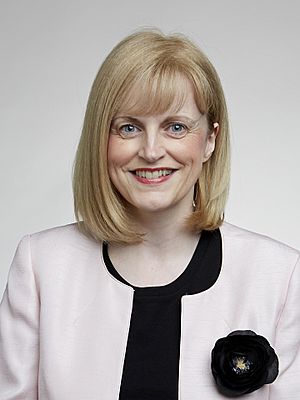Eleanor Maguire facts for kids
Quick facts for kids
Eleanor Maguire
|
|
|---|---|

Maguire in 2016
|
|
| Born | 27 March 1970 Dublin, Ireland
|
| Died | 4 January 2025 (aged 54) London, England
|
| Alma mater | University College Dublin (BA, PhD) University of Wales, Swansea (MSc) |
| Years active | 2007–2025 |
| Awards |
|
| Scientific career | |
| Fields |
|
| Institutions |
|
| Thesis | Real-world spatial memory following temporal-lobe surgery in humans (1994) |
| Doctoral students | Demis Hassabis |
Eleanor Anne Maguire (born March 27, 1970 – died January 4, 2025) was an amazing Irish scientist. She was a neuroscientist, which means she studied the brain and how it works. Eleanor Maguire was a professor at University College London and a lead researcher there. She focused on how our brains help us think and remember.
Contents
Early Life and Education
Eleanor Maguire was born in Dublin, Ireland, on March 27, 1970. She loved learning about the mind. She first studied psychology at University College Dublin. In 1990, she earned her first degree.
She then went on to study neuropsychology at University of Wales, Swansea. This field looks at how brain injuries affect behavior. She earned her Master's degree in 1991. Later, she returned to University College Dublin for her PhD.
While working at a hospital, she became very interested in how memory works in the brain. She finished her PhD in 1994. Her research was about how people remember places in the real world.
Researching the Brain
Eleanor Maguire became a top researcher at University College London. She was also the deputy director at the Wellcome Trust Centre for Neuroimaging. This center is a place where scientists study the brain using special tools.
Maguire led a team that studied memory and space. They wanted to understand how our brains remember personal events. These are memories like what you had for breakfast or your last birthday. They also studied how we navigate and imagine things.
How Memory Works
Maguire's team found that many parts of the brain work together for memory. These same brain areas also help us find our way around. They even help us imagine the future. Her goal was to learn how these different functions use the same brain parts.
They used special brain scans called magnetic resonance imaging (MRI). These scans create detailed pictures of the brain. They also tested people's behavior and studied patients with memory loss.
Famous Taxi Driver Study
One of her most famous studies involved London taxi drivers. These drivers have to learn thousands of streets. Maguire found that their brains actually changed. The part of their brain called the hippocampus grew larger. This area is very important for memory and navigation.
This research showed that our brains can change and adapt. It was exciting for other scientists and the public.
Other Discoveries
Maguire also showed that people with amnesia (severe memory loss) cannot imagine the future. This was a big discovery. Her team also found ways to "decode" memories. They could see patterns in brain activity that matched what people were remembering.
Her main focus was the hippocampus. She also studied other brain areas linked to memory. She taught many students, including Demis Hassabis, who is now a famous AI scientist.
Sharing Science with Everyone
Eleanor Maguire believed in sharing science with the public. She gave talks and visited schools. She appeared on TV and radio. She even worked with artists to make science fun. She wanted everyone to see how important science is in daily life.
Personal Life and Passing
Eleanor Maguire enjoyed comedy and was a big fan of the Crystal Palace Football Club. She also joked about "getting lost."
Sadly, Eleanor Maguire was diagnosed with spinal cancer in 2022. She passed away on January 4, 2025, at the age of 54.
Awards and Honors
Eleanor Maguire received many awards for her amazing work:
- 2003: The Ig Nobel Prize for Medicine. She won this for her study on London taxi drivers' brains.
- 2008: The Rosalind Franklin Award from the Royal Society.
- 2012: The IBRO-Kemali Prize.
- 2016: University College Dublin Alumnus of the Year.
She was also named one of "Twenty Europeans who have changed our lives." In 2016, she became a Fellow of the Royal Society (FRS). This is a very high honor for scientists. In 2018, she became a Fellow of the British Academy (FBA).
See also
 In Spanish: Eleanor Maguire para niños
In Spanish: Eleanor Maguire para niños
 | May Edward Chinn |
 | Rebecca Cole |
 | Alexa Canady |
 | Dorothy Lavinia Brown |

